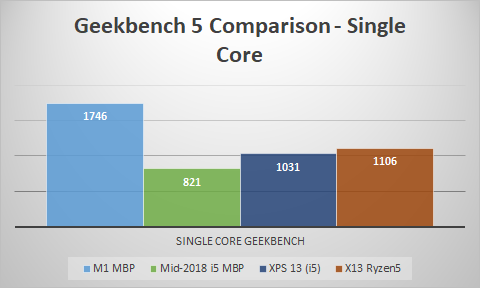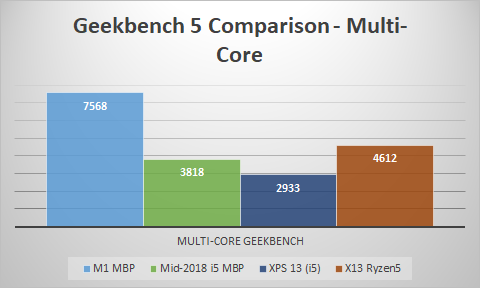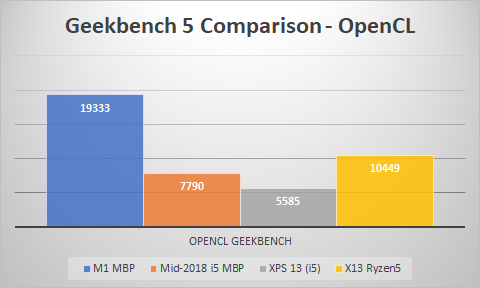Did some basic benchmarking on the new Apple Macbook Pro with the M1 processor. There has been a lot of reviewer buzz about benchmark performance.
To understand how it compares to the rest of the market, I compared it to a few other laptops I had laying around.
To understand how it compares to the rest of the market, I compared it to a few other laptops I had laying around.
All of the reviewer comparisons I've seen have been comparing the new M1-based MacBooks to previous Apple MacBook Pros. So I decided to do a little testing today to compare it with other machines I regularly use.
Yes...this includes an older MacBook Pro.
Yes...this includes an older MacBook Pro.
I'll be comparing the new MacBook Pro 13 with the M1 and 16GB of RAM to the following machines:
Mid-2018 MacBook Pro 13 - i5-8259U/8GB RAM
Dell XPS 13 9380 - i5-8365U/16GB RAM
Lenovo X13(AMD) - Ryzen 5 PRO 4650U/16GB RAM
In case you couldn't tell, I really like 13 inch machines.
Mid-2018 MacBook Pro 13 - i5-8259U/8GB RAM
Dell XPS 13 9380 - i5-8365U/16GB RAM
Lenovo X13(AMD) - Ryzen 5 PRO 4650U/16GB RAM
In case you couldn't tell, I really like 13 inch machines.
The two MacBooks were running MacOS 11.0. The XPS13 and the Lenovo X13 were both running Windows 10 Pro 20H2.
All machines had a clean install of their respective OS with a stock configuration to ensure no other software interfered. Windows Defender was NOT turned off.
All machines had a clean install of their respective OS with a stock configuration to ensure no other software interfered. Windows Defender was NOT turned off.
All testing was done with the GeekBench5 benchmark tool. The M1 was tested using the Apple Silicon native version of the app. I should probably rerun it in the future using Rosetta to do Intel emulation.
First up is the Geekbench 5 Single Core test. The M1 outperformed all of the competition. I don't think there are any surprises here.
Second is the Geekbench multi-core test. The M1 really excelled here. One interesting thing I noticed in these results is that the mid-2018 i5 MBP outperformed the XPS13. I wonder if this is due to Windows.
Finally, the Geekbench5 OpenCL test results. Again, the M1 outperformed all of the Intel machines that I tested.
Just looking at the benchmark results and comparing them to two other 13-inch Win laptops, it's clear that Apple has significantly raised the bar with their custom silicon. This is the low-end custom Apple processor, and it significantly outperforms other laptops in it's class.
I realize that these are benchmarks, and that doesn't necessarily translate into real-world performance. But this is still a huge leap in performance for laptops.
I'm very interested to see what NVIDIA can do with ARM now.
I'm very interested to see what NVIDIA can do with ARM now.

 Read on Twitter
Read on Twitter




